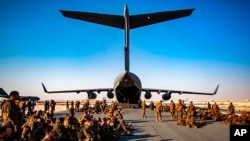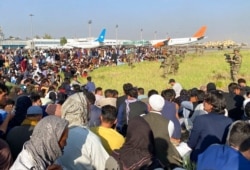U.S. President Joe Biden vowed to stay in Afghanistan until all U.S. citizens who want to leave have been evacuated, as he stands firmly by his decision to leave the country, despite the chaos that has ensued.
"I don't think it could've been handled in a way that there — we're — going to go back in hindsight and look, but the idea that somehow there's a way to have gotten out without chaos ensuing, I don't know how that happens," Biden said in an interview with George Stephanopoulos of ABC News. He dismissed questions about scenes of Afghans clinging to a U.S. aircraft as it took off as something that happened "days ago."
The president stressed that the U.S. military is now in control at the airport and evacuating thousands with the goal of getting everyone who needs to be evacuated out, both American and Afghan, by August 31.
When pressed whether troops will stay if the U.S. doesn't meet the August 31 deadline, Biden said, "If we don't, we'll determine who's left … and if there's American citizens left, we're going to stay until we get them out."
The omission of at-risk Afghans and Special Immigrant Visa (SIV) applicants in his answer is likely to disturb the thousands yet to be evacuated and their American allies who are desperate to get them out.
Pentagon officials said Thursday that to date, the U.S. military had evacuated 7,000 people in recent days, for a total of 12,000 evacuated since the end of July.
Concern is growing with reports that Afghans and American citizens are having trouble getting to the airport due to Taliban checkpoints. The U.S. is continuing to communicate with local Taliban commanders on the ground to move people through the checkpoints.
"It comes down a lot to the credentialing and making sure that they can prove — and we can prove — that these are appropriate people to move through. And we have indications this morning that that process is working," Pentagon press secretary John Kirby told reporters Thursday.
The State Department echoed figures from the Pentagon, with spokesman Ned Price telling reporters Thursday that 6,000 people had been “fully processed” and would soon board planes out of Afghanistan.
"Overnight, we significantly expanded how many American citizens, locally employed staff, SIV applicants and other vulnerable Afghans who are eligible for departure, and we offer them to consider transit to the airport,” he told reporters.
In a statement Thursday, Price also noted that U.S. Secretary of State Antony Blinken had spoken with NATO Secretary-General Jens Stoltenberg about efforts to safely evacuate allied forces and their Afghan partners.
Secretary of Defense Lloyd Austin told reporters Wednesday at the Pentagon that U.S. troops would stay focused on protecting the airfield. Chaos and panic on Monday halted air traffic there for hours and led to multiple deaths.
"I don't have the capability to go out and extend operations currently into Kabul," Austin said.
Up to 15,000 Americans and tens of thousands of at-risk Afghans remain in Afghanistan after the Taliban took full control of the nation last weekend.
In the interview, which aired early Thursday, Biden said that even with the Taliban in power in Afghanistan, he still sees a greater threat from al-Qaida and its affiliated organizations elsewhere.
"We should be focusing on where the threat is the greatest," Biden said, referencing "looming problems, growing problems" in Africa and Syria.
He also defended his administration's decisions based on the intelligence coming from Afghanistan, saying the intelligence he saw said a Taliban takeover was "more likely by the end of the year," and that the government's collapse in such a short time was not anticipated.
His comments echoed those of General Mark Milley, chairman of the Joint Chiefs of Staff, who told reporters Wednesday the time frame of a government collapse "was widely estimated and ranged from weeks to months and even years following our departure."
"There was nothing that I or anyone else saw that indicated a collapse of this army and this government in 11 days," he added.
However, a senior U.S. intelligence official, speaking to VOA on condition of anonymity, said the U.S. community "consistently identified the risk of a rapid collapse of the Afghan government."
"We also grew more pessimistic about the government's survival as the fighting season progressed. … That said, the Afghan government unraveled even more quickly than we anticipated," the official said.
The White House said the president met with his national security team to discuss security, diplomatic and intelligence updates in Afghanistan early Thursday. The team discussed the status of operations at Hamid Karzai International Airport and efforts to evacuate U.S. citizens, embassy personnel, SIV applicants and their families, and vulnerable Afghans as quickly as possible.
National Security Correspondent Jeff Seldin contributed to this report.






